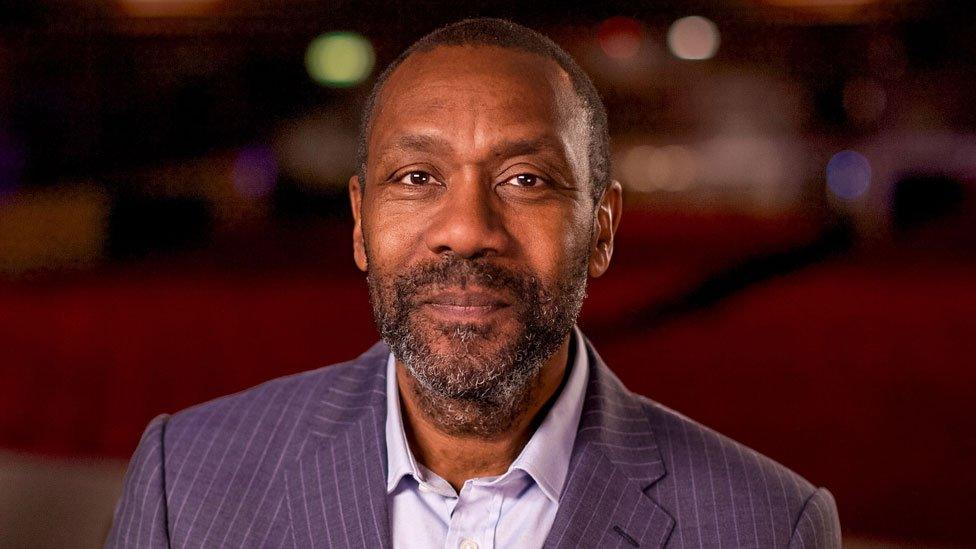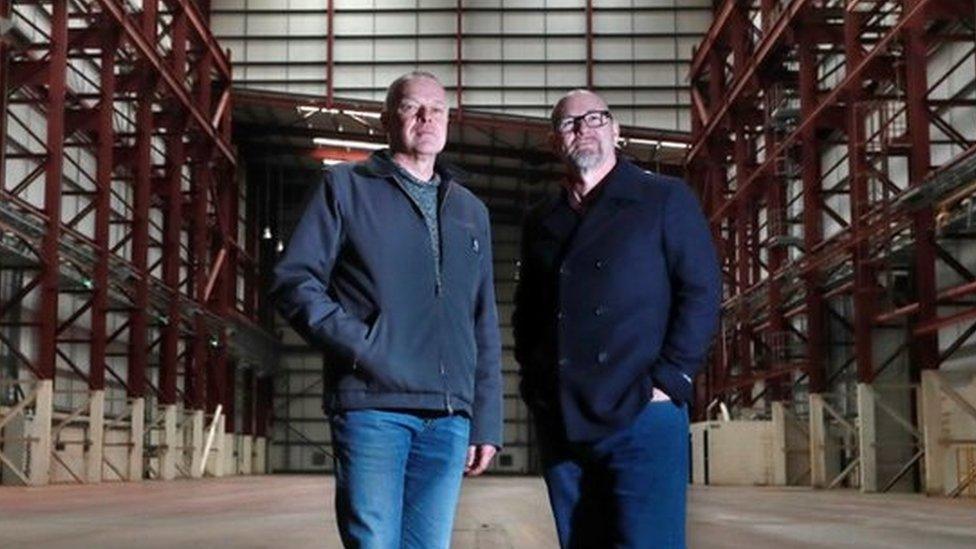'TV and film is booming but we need to keep going'
- Published

Douglas Mackinnon with Michael Sheen on the set of Good Omens
A new report by Screen Scotland shows the TV and film industry contributed almost £568m to Scotland's economy in 2019 and the Scottish government hopes it can double to £1bn by the end of the decade.
At the FirstStage Studios in Leith docks the vast main space is now empty but until a week ago it was humming with activity as Anansi Boys, one of two major shows being made for Amazon Prime, was about to wrap.
Douglas Mackinnon, who hails from Skye, is a director and showrunner for both Anansi Boys and Good Omens, both of which were made in Scotland.
He said: "We were ready to do the second season of Good Omens, and a first season of Anansi Boys, both based on books by Neil Gaiman, and then the pandemic happened.
"Everything shut down and then at the tail end of 2020, Amazon said we'd like you to do both.
"I told them the only way was if they were done alongside each other and suggested we do that in Scotland.
"There were lots of discussions, and of course it all came down to money and practicalities but the bottom line was we could make it in Scotland, and at the top level."

Neil Gaiman's works include The Sandman and Good Omens
A new report published by Screen Scotland focuses on 2019, before the Covid pandemic and long before the FirstStage studio was in action, or indeed any of the recent productions.
It found that £568m was spent in the industry that year thanks to various productions including Outlander series 5, the 25th James Bond film No Time to Die and season four of The Crown. It also included Our Ladies, directed by Michael Caton Jones, The Cry and Netflix's Eurovision film with Will Ferrell.
Scottish Culture Secretary Angus Robertson says the report shows the value of the industry is now three times larger than was previously thought to be the case.
"If the growth trend continues, it will grow from half a billion to £1bn by the year 2030," he said. "This is tremendous news for the Scottish economy in general."
Mackinnon told me: "It certainly feels like it's booming and I'm pleased if the two productions I've been working with have helped that boom to happen.
"But it's a slightly annoying word because we know what happens after a boom is a bust.
"So I'm hoping it's not a boom but something we can keep going and that our productions contribute to that, but others come along behind them."
Lightbulb moment
The Screen Scotland report suggests that the industry supports 10,280 jobs and the focus is on closing skills gaps.
"Carpenters, plasterers, drivers, caterers, security. These adjacent industries are all an important part of our sector," says Isabel Davis of Screen Scotland.
"If this report is able to offer people that lightbulb moment which says that the industry is for them, that's good."
Emma Picken is keen to follow through with the promise. She works for Be United, a platform promoting black, African and Caribbean creatives based in Scotland.

Sir Lenny Henry has been a friend of Gaiman's for more than 30 years
They were able to provide 500 extras for Anansi Boys, whose lead cast include Lenny Henry and Whoopi Goldberg.
"It debunked the myth that Scotland couldn't provide a diverse range of people," she says.
"It was new to us because we'd only really worked with arts projects before, but we were able to bring in hundreds of people from black communities.
"It can be quite daunting if you don't know the industry, but opportunities like this are a great way to get into and onto a set.
"We're already hearing from people who started out as extras and are now saying, we'd like to get into acting, or directing, or see what happens behind the camera."
Bond actors on filming No Time To Die amongst Scotland's midges
The report also includes the TV sector - and is timely, given the UK government's proposal to privatise Channel 4.
Addressing the parliament's Constitution, Europe, External Affairs and Culture Committee on Friday morning, David Smith, director of screen at Screen Scotland, described public sector broadcasters as the cornerstone of the creative economy.
In Scotland, he said, the BBC and Channel 4 accounted for 87% of the sector, and could be jeopardised by privatisation.
"There's no evidence to suggest that the sale of Channel 4 to a private buyer would be good for Scotland or for the UK production sector and I think we have plenty of reasons to be concerned," Mr Smith said.
The boom is part of a worldwide demand for content, and Scotland is only one of the many places bidding for work.
A similar report published by Screen Alliance Wales last year, showed 8,000 people working in the industry, generating £2.2bn. Scotland has some way to catch up but the industry believes with the new studio spaces on offer, and training opportunities, they should be able to double the current figure by the end of the decade.

Netflix's Eurovision: the story of fire saga, starring Will Farrell, was partially filmed in Scotland
Culture secretary Angus Robertson says: "Historically in Scotland, we in effect had market failure except for TV. We did not have the boom in film that was common in London and the south east. As a result, we didn't have studio space, and we had intermittent film and TV productions. If anyone wanted a career in the industry, they had to leave Scotland.
"We now have a proliferation of studio productions from traditional commissioners, the public service broadcasters, they've been joined by the streaming services."
He said that in just a few years Scotland had gone from having very limited studio space to having a proliferation of new studios.
"The Scottish government is trying to help the growth trend continue in terms of helping to secure studio space, helping to secure new television and film productions, but then also help assist in the training of people who want to work in the film and TV industry, because companies that are wanting to film productions in Scotland need to know that the talent is here to do all of the important jobs, on-set, pre-production, post-production."
Related topics
- Published25 September 2021

- Published21 July 2021

- Published29 June 2021

- Published10 March 2020

- Published24 November 2021
